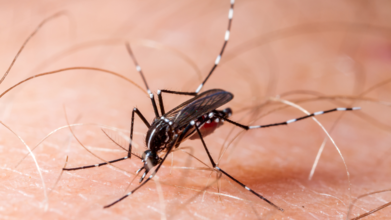- Health Conditions A-Z
- Health & Wellness
- Nutrition
- Fitness
- Health News
- Ayurveda
- Videos
- Medicine A-Z
- Parenting
- Web Stories
Compound Versions Of Some Weight Loss Drugs Still Being Sold In US, Despite Federal Warnings

Credit: Canva
Nearly two weeks after US Health authorities set a timeline for compounding pharmacies to end the production of duplicate weight loss drugs, things have not changed online. Popular websites like Amble, EllieMD, Willow and Mochi Health are all still advertising versions of Tirzepatide, the active ingredient in Zepbound. Compounded versions of Mounjaro, a Tirzepatide, are also openly available across online platforms.
What Is Compounding?
Compounding is where pharmacies mix ingredients of a drug to create a specialised version for specific patients. Say someone is allergic to a dye in a branded medication or needs a liquid form and the main manufacturer only sells capsules. In that case, the patient can turn to a compounded version or the liquid form. Moreover, when drugs are in shortage, they can be compounded in larger quantities to help fill the gap.Mochi Health, a leading telehealth company in the US, has no plans to stop and neither do the four pharmacies, it uses to supply patients with medications. According to CNBC, the company uses a network of about 500 providers to write prescriptions for weight-loss drugs, including compound versions. It is betting that offering personalised versions of drugs will keep the company out of the crosshairs. Speaking to a leading health news website, CEO Myra Ahmad underscored that there can be different dosing schedules for different patients. Some patients prefer to go up in dosage much more slowly while others like to mix some other medications into their compounded formulations, depending on the side effects that they’re having. Some patients have side effects with any additives and brand name formulations. Compounding really opens up the door for so much personalization.
How Does Tirzepatide Weight Loss Drugs Function?
Tirzepatides, like Zepbound and Mounjaro, are typically antidiabetic medications used to treat type 2 diabetes and for weight loss. However, unlike semaglutide like Ozempic, these drugs work on two hormone receptors. Muanjaro and Zepbound activate both GIP (glucose-dependent insulinotropic polypeptide) and GLP-1 (glucagon-like peptide-1) hormone receptor agonists, leading to an increase in the production of insulin when needed. They also reduce the amount of glucose, or sugar, produced by the liver, and slow down how quickly food is digested. This all helps to lower blood sugar levels and HbA1c. Notably, the fact that Tirzepatides works on two receptors doubles its efficiency than semaglutides like Ozempic and Wegovy.
How Much Are Zepbound And Mounjaro Priced?
Zepbound and Mounjaro, two medications manufactured by Eli Lilly, are part of a new class of drugs designed to manage obesity and type 2 diabetes, respectively. In the US, the list price for both Zepbound and Mounjaro is approximately $1,060 for a one-month supply, depending on the dosage. While insurance coverage can significantly reduce out-of-pocket costs for some patients, others may face the full price if the medications are not covered under their health plans. Eli Lilly has introduced savings programs and discount cards to improve access, but affordability remains a challenge for many, especially those without comprehensive insurance.ALSO READ: Eli Lily's Weight Loss Drug Mounjaro Now Available In India
Top U.S. Medical Associations Ousted from CDC Vaccine Workgroups in Sudden Shake-Up

Credits: Canva
In a controversial move that has rattled the U.S. medical community, federal health officials have severed ties with more than half a dozen major medical organizations from participating in government vaccine advisory workgroups.
The decision, communicated via email on Thursday, disinvites top experts from these groups from contributing to the workgroups that support the Advisory Committee on Immunization Practices (ACIP), a key body that guides the nation’s vaccination policies.
Organizations affected include the American Medical Association (AMA), the American Academy of Pediatrics (AAP), the Infectious Diseases Society of America (IDSA), and several others, many of whom have historically played a critical role in shaping vaccine guidelines.
“This is deeply concerning and distressing,” said Dr. William Schaffner, a renowned vaccine expert from Vanderbilt University who has been involved with ACIP workgroups for decades. “Removing these organizations will likely create conflicting messages about vaccine guidance. Patients might hear one thing from the government and another from their personal doctors.”
Longstanding Collaboration Ends Abruptly
For years, the ACIP has relied on a structured system where experts from various medical and scientific fields evaluate vaccine data and help draft recommendations. These recommendations, once approved by the Centers for Disease Control and Prevention (CDC), often inform clinical practice and determine insurance coverage.
But according to an email obtained by Bloomberg and confirmed by federal officials on Friday, the medical organizations are now being sidelined on the grounds that they are “special interest groups” and are assumed to carry a “bias” due to the populations they serve.
Dr. Schaffner defended the former system, highlighting how professional organizations offered practical insights on how recommendations could be realistically implemented in clinical settings. Importantly, all members were subject to conflict-of-interest vetting, ensuring objective guidance, he added.
Health Secretary Kennedy’s Sweeping Changes
This latest shake-up follows an earlier, unprecedented move in June when U.S. Health Secretary Robert F. Kennedy Jr. abruptly dismissed the entire ACIP panel, accusing it of being too closely aligned with vaccine manufacturers. Kennedy, a former leader in the anti-vaccine movement, has since appointed several known vaccine skeptics to the new committee.
Among the organizations removed from the workgroup process are the American Academy of Family Physicians, American College of Physicians, American Geriatrics Society, American Osteopathic Association, National Medical Association, and the National Foundation for Infectious Diseases.
In a joint statement released Friday, the AMA and several of the disinvited organizations denounced the decision, calling it “irresponsible” and “dangerous to our nation’s health.” The statement warned that excluding their medical expertise “will further undermine public and clinician trust in vaccines.”
The groups urged the administration to reverse the decision, emphasizing the importance of transparency and collaboration in public health decision-making.
Lawsuit and Fallout
Several of the ousted organizations had previously criticized Kennedy’s overhaul of the ACIP. Last month, three of them joined a lawsuit challenging the government’s decision to halt COVID-19 vaccine recommendations for most children and pregnant women, a policy shift that has been widely criticized by public health experts.
Meanwhile, newly appointed ACIP member Retsef Levi, a professor of business management with no formal medical background, defended the administration's direction on social media. Levi wrote that future workgroups would “engage experts from an even broader set of disciplines,” and claimed that membership would be based on “merit & expertise, not organizational affiliations with conflicts of interest.”
The Department of Health and Human Services (HHS) has not yet disclosed which experts will replace the disinvited members or when the new workgroups will begin operating.
US Weighs China Travel Warning As Chikungunya Cases Near 5,000: Report

Credits: Canva
The United States Centers for Disease Control and Prevention (CDC) is assessing a potential travel notice for China following a sharp rise in cases of chikungunya, a mosquito-borne viral infection that has sparked public health alarms in southern China, as reported by the Independent and the South China Morning Post.
Nearly 5,200 infections have been reported in the Guangdong province since early July, with most of them concentrated in the city of Foshan. Health officials there have since escalated their emergency response to a level III alert, which signals a “relatively major” public health threat in China’s four-tier system.
While the CDC has not yet published a formal advisory, a spokesperson told The Independent that the agency is “aware of the reported chikungunya outbreak in Guangdong Province in China and is currently assessing the size and extent of the outbreak.”
What is chikungunya?
Chikungunya is a viral infection transmitted by the bite of an infected Aedes mosquito, the same mosquito species responsible for dengue and Zika. Symptoms typically include sudden onset of fever and joint pain, but may also include headache, muscle pain, swelling, and rash.
Although most cases are mild and self-limiting, some infections can lead to prolonged joint pain or, in rare cases, long-term complications. Serious outcomes are more likely among those with pre-existing health conditions. There are no antiviral treatments available, so prevention, particularly mosquito control and bite avoidance, remains the primary approach.
Vaccines against chikungunya have recently become available and are recommended for travelers to high-risk areas, although they are not yet widely accessible.
According to local health authorities in Foshan, around 95% of reported cases have been mild, with patients recovering within a week. However, the outbreak’s rapid spread has raised concern among international health bodies.
Global spread and WHO alert
The outbreak in China follows a global pattern of chikungunya resurgence. The World Health Organization (WHO) issued an alert last week warning of the risk of the virus repeating its global spread from two decades ago. Diana Rojas Alvarez, a medical officer with WHO, said that nearly 5.6 billion people across 119 countries live in areas where the virus could potentially spread.
Chikungunya was first identified in 1952 in Tanzania and has since been detected in more than 110 countries, including major outbreaks in India, Italy, and the Americas. The virus is not spread from person to person; instead, it is carried by mosquitoes that have fed on infected individuals and then pass it to others.
The concern is not just local: international travel plays a key role in how the virus crosses borders. Infected travelers returning to or visiting countries with mosquito populations capable of transmitting the virus can trigger new outbreaks.
China’s response: Mosquito control and surveillance
The first case in this outbreak was reported in Foshan’s Shunde district on July 8 and was believed to be imported. Since then, local and national health authorities have moved quickly to contain the spread.
Measures taken include the use of drones to detect rooftop water accumulation, the release of larva-eating fish into lakes, and widespread public awareness campaigns. Residents have been urged to eliminate standing water, install window screens, and wear protective clothing.
Hospitals in affected areas have increased bed capacity for confirmed cases and designated specialized treatment centres. Border controls have been stepped up in Hong Kong to prevent imported cases from mainland China, with expanded testing capabilities introduced at key entry points.
CDC travel warnings: What it means for travelers
The CDC’s travel health notices are used to inform travelers about global disease risks and provide precautionary guidelines. The warning system has four levels, ranging from “practice usual precautions” (Level 1) to “avoid all travel” (Level 4).
As of now, China has only a Level 1 travel health notice for measles. However, the CDC has issued Level 2 notices for chikungunya in several countries including Bolivia, Kenya, and Madagascar in recent months.
If the CDC decides to escalate China’s status, it would be a significant development, both in terms of travel planning and diplomatic perception.
US–China tension and public health
The potential issuance of a travel notice also comes against the backdrop of complex US–China relations. While the CDC’s move would be grounded in public health data, the optics of a travel warning could have broader implications.
On Thursday, Chinese foreign ministry spokesperson Guo Jiakun responded to the reports, saying that China is in communication with the WHO and “making every effort to ensure a safe environment for travelers.”
The WHO has not issued any travel restrictions related to the outbreak but continues to monitor the situation closely.
A word of caution for travelers
With mosquito-borne diseases on the rise globally, driven by climate change, urbanization, and increased mobility, health experts advise travelers to stay informed and take preventive measures.
“Mosquito control is key,” said an official from the Hong Kong Centre for Health Protection. “Simple actions like using insect repellent, sleeping under mosquito nets, and avoiding stagnant water can go a long way in preventing infection.”
As global health agencies monitor the chikungunya outbreak in China, travelers to affected areas should remain vigilant and stay updated with official advisories. Prevention remains the best protection in the face of a disease with no cure.
World Alopecia Day 2025: Theme, Origin, And Significance

Credits: Canva
August is known as the Hair Loss Awareness Month and the first Saturday of this month is known as the International Alopecia Day.
Hair loss is a common concern, affecting over 85% of men, 55% of women, and between 15–38% of adolescents at some point in their lives. For those with advanced or long-lasting alopecia, the emotional and social impact can be profound.
Baldness has been linked to significant declines in mental health and quality of life, with higher rates of anxiety, depression, stress, and reduced self-esteem.
What Is Alopecia?
It is a term used for hair loss that affects the scalp or even the entire body, temporarily or permanently. Alopecia can happen due to variety of reasons, including heredity, hormonal changes, and medical conditions, or as simple as normal aging.
Aim of Alopecia Day
The day aims to form a community of those who experience this autoimmune disease.
Origin of International Alopecia Day
International Alopecia Day was initiated by American activist Lynn W. Walker in 2011. She herself lives with a diagnosis of alopecia totalis and created this day to unite people with similar experiences, reduce stigma, and highlight beauty and strength regardless of the presence of hair.
Theme of Alopecia Day 2025
This year's theme as per Alopecia UK is, 'Strength in Numbers', which urges more and more people to join the International Alopecia community and to do away with the shame of hair loss and form a support group, across the world.
Alopecia And Its Kinds
As per the National Library of Medicines, US, alopecia refers to the loss or absence of hair in areas where it normally grows. It can be localized or widespread, temporary or permanent, and affects people of all ages and genders. As a symptom with diverse underlying causes, alopecia is generally categorized into two main types: nonscarring (the most common) and scarring (cicatricial).
For many patients, hair loss leads to significant emotional distress and a reduced quality of life. Accurate diagnosis requires a thorough history, physical examination, and targeted investigations to identify the root cause and guide effective treatment. Managing alopecia can be challenging, but this overview outlines key assessment and treatment approaches for the most common forms to support better outcomes.
Forms of alopecia
There are several main types of alopecia, including:
alopecia areata: an autoimmune disease that causes hair loss, often in small, round patches on the scalp, but it can occur anywhere on the body
alopecia totalis: complete loss of scalp hair
alopecia universalis: hair loss over the entire body
androgenetic alopecia: hereditary baldness
Ways You Can Participate In International Alopecia Day
- Learn and share knowledge about alopecia
- Participate in activities for Alopecia Day
- Embrace the symbol by wearing blue
- Share you story to build a support group
- If you are a doctor, you can also advocate for the right alopecia treatment
- Contribute financially to alopecia research and awareness groups
- Volunteer to help spread alopecia awareness
- Raise voice against bullying, as many people are bullied due to their hair loss
© 2024 Bennett, Coleman & Company Limited

